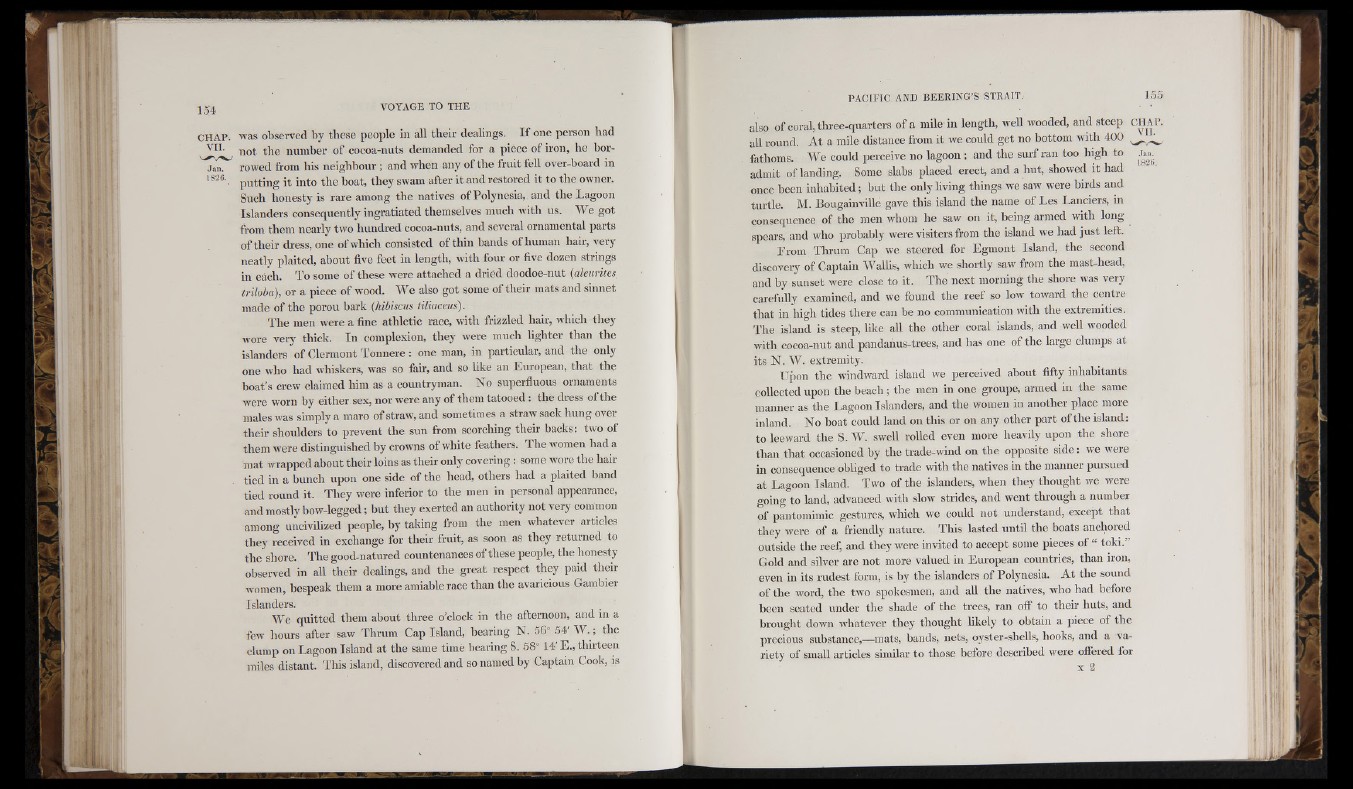
was observed by these people in all their dealings. I f one person had
not the nnmber of cocoa-nuts demanded for a piece of iron, he borrowed
from his neighbour ; and when any of the fruit fell over-board in
putting it into the boat, they swam after it and restored it to the owner.
Such honesty is rare among the natives of Polynesia, and the Lagoon
Islanders consequently ingratiated themselves much with us. We got
from them nearly two hundred cocoa-nuts, and several ornamental parts
of their dress, one of which consisted of thin bands of human hair, very
neatly plaited, about five feet in length, with four or five dozen strings
in each. To some of these were attached a dried doodoe-nut {aleurites
triloba), or a piece of wood. YVe also got some of their mats and sinnet
made of the porou bark {hibiscus tiliaceus).
The men were a fine athletic race, with frizzled hair, which they
wore very thick. In complexion, they were much lighter than the
islanders of Clermont Tonnere : one man, in particular, and the only
one who had whiskers, was so fair, and so like an Luropean, that the
boat’s crew claimed him as a countryman. No superfluous ornaments
were worn by either sex, nor were any of them tatooed: the dress of the
males was simply a maro of straw, and sometimes a straw sack hung over
their shoulders to prevent the sun from scorching their backs: two of
them were distinguished by crowns of white feathers. The women had a
mat wrapped about their loins as their only covering : some wore the hair
tied in a bunch upon one side of the head, others had a plaited band
tied round it. They were inferior to the men in personal appearance,
and mostly bow-legged; but they exerted an authority not very common
among uncivilized people, by taking from the men whatever articles
they received in exchange for their fruit, as soon as they returned to
the shore. The good-natured countenances of these people, the honesty
observed in all their dealings, and the great respect they paid their
women, bespeak them a more amiable race than the avaricious Gambier
Islanders.
YY’e quitted them about three o’clock in the afternoon, and in a
few hours after saw Thrum Cap Island, bearing N. 56” 54' YV.; the
clump on Lagoon Island at the same time bearing S. 68” 14' E., thirteen
miles distant, 'riiis island, discovered and so named by Captain Cook, is
also of coral, three-quarters of a mile in length, well wooded, and steep CHAP,
all round. At a mile distance from it we could get no bottom with 400
fathoms. YVe could perceive no lagoon ; and the surf ran too high to
admit of landing. Some slabs placed erect, and a hut, showed it liad
once been inhabited; but the only living things we saw were birds and
turtle. M. Bougainville gave this island the name of Les Laiiciers, in
consequence of the men whom he saw on it, being armed with long
spears, and who probably were visiters from the island we had just left.
Lrom Thrum Cap we steered for Egmont Island, the second
discovery of Captain YY"allis, which we shortly saw from the mast-head,
and by sunset were close to it. The next morning the shore was very
carefully examined, and we found the reef so low toward the centre
that in high tides there can be no communication with the extremities.
The island is steep, like all the other coral islands, and well wooded
with cocoa-nut and paiidanus-trees, and has one of the large clumps at
its N . YY". extremity.
Upon the windward island we perceived about fifty inhabitants
collected upon the beach; the men in one groupe, armed in the same
manner as the Lagoon Islanders, and the women in another place more
inland. No boat could land on this or on any other part of the island:
to leeward the S. YV. swell rolled even more heavily upon the shore
than that occasioned by the trade-wind on the opposite side: we were
in consequence obliged to trade with the natives in the manner pursued
at Lagoon Island. Two of the islanders, when they thought we were
going to land, advanced with slow strides, and went through a nnmber
of pantomimic gestures, which we could not understand, except that
they were of a friendly nature. This lasted until the boats anchored
outside the reef, and they were invited to accept some pieces of “ toki.
Gold and silver are not more valued in European countries, than iron,
even in its rudest form, is by the islanders of Polynesia. At the sound
of the word, the two spokesmen, and all the natives, wlio had before
been seated under the shade of the trees, ran off to their huts, and
brought down whatever they thought likely to obtain a piece of the
precious substance,—mats, bands, nets, oyster-shells, hooks, and a variety
of small articles similar to those before described were offered for
X 2